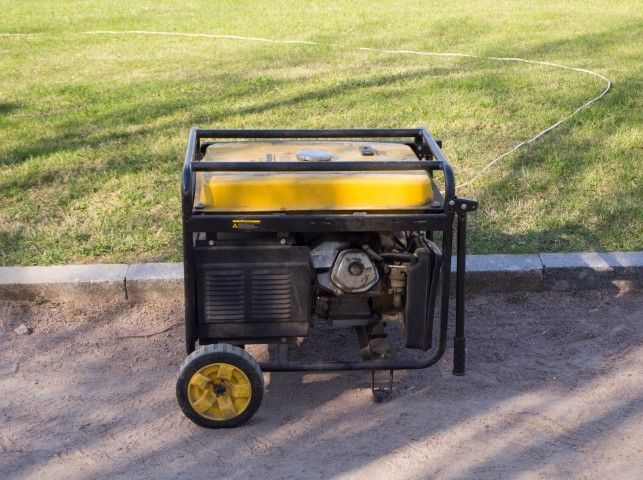Electric Generators in Charlotte NC
Electric generators are machines that convert mechanical energy into electrical energy. This process is crucial when there's a need for backup power during outages or in locations without a reliable electrical supply. Essentially, a generator uses fuel to create electricity, providing a temporary power source that can keep your home or business running smoothly when the main power grid fails.
Types of Electric Generators
Generators come in various types, each suited for different needs:
- Portable Generators: These are compact, versatile units often used for temporary power during outages or for outdoor activities. They are easy to transport and ideal for personal or small-scale use.
- Standby Generators: Installed permanently, these generators automatically kick in during power failures. They are connected directly to your home’s electrical system and can provide continuous power for an extended period.
- Inverter Generators: Known for their fuel efficiency and quieter operation, inverter generators are suitable for sensitive electronics and provide a stable power supply.
- Diesel Generators: Often used for commercial or industrial purposes, these generators are durable and designed for heavy-duty use. They are efficient and can run for extended periods.
- Natural Gas Generators: These are a cleaner alternative to diesel generators and are ideal for long-term power solutions, particularly in areas where natural gas is readily available.
Key Components
A typical electric generator consists of several key parts:
- Engine: The engine is the heart of the generator, responsible for converting fuel into mechanical energy. It powers the alternator and determines the generator’s output capacity.
- Alternator: This component converts mechanical energy from the engine into electrical energy. It produces alternating current (AC) which is then used to power your appliances.
- Fuel System: This system includes the fuel tank, fuel pump, and fuel lines. It stores and delivers fuel to the engine to keep the generator running.
- Cooling System: Generators generate heat during operation, so the cooling system is essential to prevent overheating. This usually includes a radiator or fan.
- Lubrication System: This system ensures that all moving parts in the engine are properly lubricated to reduce wear and tear and extend the generator’s lifespan.
- Control Panel: The control panel is where you start and monitor the generator. It provides information about the generator's performance and allows you to make adjustments.
Electrical Safety Precautions
When operating a generator, follow these safety guidelines:
- Proper Grounding: Ensure the generator is properly grounded to prevent electrical shocks. Use a grounding rod if necessary.
- Avoid Overloading: Do not exceed the generator’s rated capacity. Overloading can damage the generator and create a fire hazard.
- Use Appropriate Cables: Use heavy-duty extension cords rated for the generator’s wattage. Avoid using damaged or frayed cords.
- Safe Operation: Never operate a generator indoors or in enclosed spaces. Always follow the manufacturer’s instructions for safe operation.

Handling Fuel and Exhaust Hazards Properly
Generators require careful handling of fuel and exhaust to ensure safety:
- Fuel Storage: Store fuel in a cool, dry place away from open flames or heat sources. Use proper containers and never overfill the generator’s fuel tank.
- Refueling: Turn off the generator and let it cool before refueling to avoid the risk of fire or explosion. Always refuel in a well-ventilated area.
- Exhaust Management: Install the generator with appropriate exhaust systems to direct fumes away from living areas. Regularly check the exhaust system for any signs of damage or blockage.
- Spills: Clean up any fuel spills immediately to prevent accidents. Use appropriate materials and dispose of waste properly.
Maintenance and Care
Regular maintenance is vital to keep your generator running efficiently:
- Routine Checks: Inspect the generator regularly for signs of wear or damage. Check the oil levels, fuel quality, and air filters.
- Oil Changes: Follow the manufacturer’s recommendations for oil changes. Clean oil ensures the engine runs smoothly and lasts longer.
- Filter Replacements: Replace air and fuel filters as needed to maintain optimal performance. Dirty filters can reduce efficiency and cause engine problems.
- Battery Care: If your generator has a battery, ensure it is charged and in good condition. Replace the battery as necessary to avoid starting issues.
Installation and Placement
Proper installation is crucial for the safe and efficient operation of your generator. Here are some key points to consider:
- Location: Place the generator on a flat, stable surface away from your home to prevent carbon monoxide buildup. Ensure it is on a level surface to avoid fuel spillage.
- Ventilation: Generators produce exhaust gases, so adequate ventilation is essential. Avoid placing the generator in enclosed spaces or near windows, doors, or vents.
- Distance: Follow the manufacturer’s guidelines regarding the distance from your home and other structures. This helps to minimize noise and ensure safety from exhaust fumes.
- Connections: Have a professional handle the electrical connections to ensure they meet local codes and standards. Proper installation will prevent potential hazards and ensure reliable operation.
If you’re looking for reliable
electric generators in Charlotte, NC, and need professional advice or service, don’t hesitate to reach out to us. Our team is here to help with everything from selecting the right generator for your needs to installation and maintenance. Contact us today to ensure you’re prepared for any power outages and keep your home or business running smoothly. Feel free to call us or visit our website for more information and to schedule a consultation.
Different Fuel Types for Electric Generators
Electric generators play a vital role in providing backup power during outages and are essential for many operations. Choosing the right fuel source for your generator is crucial for ensuring reliable performance and efficiency. Understanding the various fuel options available can help you select the best one to meet your needs and preferences. Electric generators can operate on a range of fuel types, each with its own set of advantages and limitations. Here’s a look at the most common fuel sources:
Gasoline
Gasoline is one of the most popular fuels for portable generators due to its availability and ease of use. It offers quick starts and is often used in smaller, portable models. However, gasoline has a relatively short shelf life and can be volatile, which means it requires careful handling and storage.
Diesel
Diesel generators are favored for their durability and efficiency, particularly in larger, stationary models. Diesel fuel is more energy-dense than gasoline, providing longer run times and better performance under heavy loads. Diesel engines also tend to have a longer lifespan and require less maintenance. However, diesel fuel can be more expensive and may produce more noise and emissions.
Natural Gas
Natural gas is a clean and cost-effective fuel option, commonly used for standby generators in residential and commercial settings. It is delivered through pipelines, eliminating the need for on-site fuel storage. Natural gas generators are known for their reliability and lower emissions compared to gasoline and diesel generators. The main drawback is that the generator must be connected to a natural gas line, which may not be feasible in all locations.
Propane
Propane is another clean-burning fuel that offers flexibility and convenience. It is stored in tanks and can be used for both portable and stationary generators. Propane generators have a longer shelf life than gasoline and are less prone to issues related to fuel degradation. They also produce fewer emissions. However, propane can be more expensive than other fuels, and the availability of propane tanks can be a limitation in some areas.
Biofuel
Biofuels, such as biodiesel, are derived from renewable resources like vegetable oils or animal fats. They are an environmentally friendly alternative to traditional fossil fuels. Biodiesel can be used in diesel generators with little to no modification. The use of biofuels can reduce carbon emissions and reliance on non-renewable energy sources. However, biofuels may have a higher cost and can be less readily available than conventional fuels.
Dual-Fuel Generators
Dual-fuel generators offer the flexibility to run on either gasoline and propane or diesel and natural gas. This versatility allows users to choose the most convenient or cost-effective fuel source based on availability and pricing. Dual-fuel systems can provide additional security in emergencies by offering multiple fuel options. However, they may be more complex and costly compared to single-fuel generators.
Choosing the right fuel source for your generator is an important decision that can affect its performance and efficiency. If you need more information or assistance in selecting the best fuel option for your needs, don’t hesitate to reach out to us. Our team of experts is here to help you with any questions you may have and to ensure you get the most reliable and efficient generator solution. Contact us today to discuss your options and find the perfect generator for your needs.
Significance and Widespread Uses of Electric Generators
Ensuring Uninterrupted Power Supply
One of the primary reasons for using electric generators is to ensure an uninterrupted power supply. In areas where the power grid is unstable or prone to outages, generators provide a reliable backup. This is especially important for businesses that rely on continuous operation, such as data centers, hospitals, and manufacturing plants. By having a generator on standby, these establishments can avoid costly downtime and maintain their operations even during power interruptions.
Supporting Emergency Services
During emergencies such as natural disasters or severe weather events, electric generators are vital for supporting emergency services. Hospitals, fire stations, and police departments need a constant power supply to function effectively. Generators ensure that these critical services can continue to operate when the main power supply is disrupted. For example, they can keep medical equipment running, provide lighting and communication systems, and power emergency response vehicles.
Powering Remote Locations
Powering Remote Locations
In remote areas where extending the power grid may be impractical or too expensive, electric generators offer a practical solution. They are used in construction sites, outdoor events, and remote research facilities where electricity is required but not readily available. Generators can provide power for lighting, tools, equipment, and other essential needs in these locations, allowing activities to proceed without interruption.
Enhancing Residential Comfort
For homeowners, electric generators offer peace of mind by ensuring that essential household functions remain operational during a power outage. This includes keeping refrigerators and freezers running to prevent food spoilage, maintaining heating or cooling systems for comfort, and providing power for lights and electronic devices. Generators can be particularly valuable in regions with frequent power outages or during severe weather conditions.
Supporting Industrial and Commercial Operations
Industries and commercial establishments often depend on electric generators to support their operations. For instance, generators can be used to power machinery, production lines, and large-scale equipment. In sectors like construction, agriculture, and entertainment, generators play a key role in maintaining productivity and meeting operational requirements. They help businesses avoid disruptions and manage power needs effectively.
Facilitating Outdoor Activities
Electric generators are also commonly used in recreational settings. They power equipment for camping, outdoor events, and mobile homes, enhancing the experience of outdoor enthusiasts. From powering grills and lights to running entertainment systems and charging devices, generators add convenience and comfort to outdoor activities.
Electric generators are devices that convert mechanical energy into electrical energy, playing a crucial role in our daily lives. From powering homes to supporting critical infrastructure, these machines are indispensable in both residential and industrial settings. This article will explore why electric generators are important and highlight some of their most common applications.

If you are interested in learning more about electric generators and how they can benefit you or your business, don't hesitate to reach out. Our team of experts is ready to assist you with information, recommendations, and solutions tailored to your specific needs. Contact us today to explore your options and ensure a reliable power supply for your home or operation.
